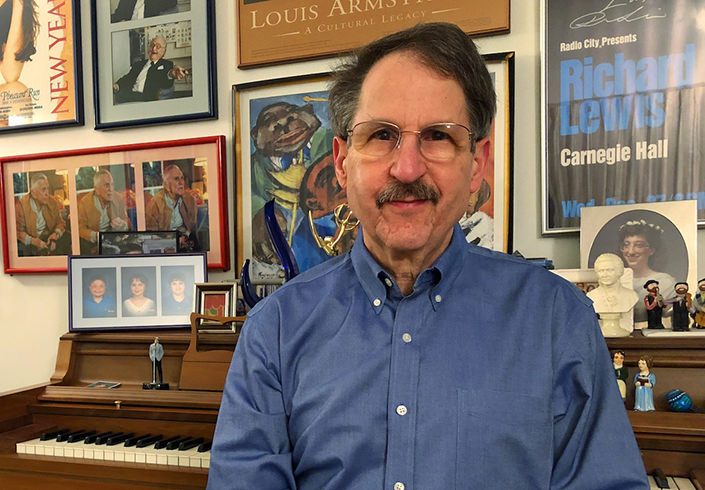Howard Reich ‘77 is an Emmy Award-winning author, journalist, and filmmaker. He has written six books: The Art of Inventing Hope: Intimate Conversations with Elie Wiesel, Prisoner of Her Past: A Son’s Memoir, Jelly’s Blues: The Life, Music and Redemption of Jelly Roll Morton (with William Gaines), Van Cliburn, Portraits in Jazz, and Let Freedom Swing. He is also writer-producer of three documentary films: For the Left Hand, Prisoner of Her Past and Kenwood’s Journey.
Reich served on the jury for the Pulitzer Prize in Music four times, including the first time a jazz composition won, Wynton Marsalis’ Blood on the Fields (1997). He covered music for the Chicago Tribune from 1978-2021; holds two honorary doctorate degrees; received Northwestern’s Alumni Merit Award in 2007; and gave the Bienen School’s convocation address in 2019.
He currently is touring the country with his film For the Left Hand, which has been broadcast nationally on PBS and now is screening around the world. He also is working with colleagues at Bravo Niagara! Festival of the Arts on creating Kimiko’s Pearl, an evening-length ballet about Japanese-Canadian internment, with a scenario written by Reich; a world premiere is planned for spring of 2024.
Why did you choose the Bienen School of Music?
In fact, I applied and was accepted to the Medill School of Journalism. However, a few weeks before my freshman year began, I realized I could no longer resist my desire and need to study music. So, I auditioned as a piano major for Professor Donald Isaak and was immediately accepted into Bienen. I cannot overstate the importance of my studies at Bienen to the entirety of my career; this is where I encountered mountains of repertoire then unfamiliar to me, learned to analyze works of music note-for-note, and came to appreciate more deeply than ever the potential value of a life spent in music and the arts.
Which professors influenced you the most during your time at the Bienen School of Music?
Two stand out. Wanda Paul, a brilliant and groundbreaking concert pianist in her own right, imbued me with musical values I treasure to this day. Thomas Willis, then the Chicago Tribune’s music critic, similarly shaped the values I try to follow in my own writing. In addition, I feel lucky to have studied contemporary repertoire with composer Alan Stout, ear training with musicologist Arrand Parsons, and music theory with composer M. William Karlins.
Tell us about a particular experience that impacted you during your time at the Bienen School of Music.
Once a year, during our weekly piano solo class in Lutkin Hall, we’d hear a performance by the eminent American pianist Ralph Votapek ’60, a Bienen alum and first winner of the Van Cliburn International Piano Competition in 1962. Never before had I heard a pianist of this world-class caliber in such an intimate setting. I was so moved by these performances that when I became a Chicago Tribune music critic, I wrote about Votapek at every opportunity.
What lesson did you learn at Bienen that has continued to resonate with you in your career?
Wanda Paul, my piano professor, insisted that we music students not lock ourselves in our practice rooms but get out to attend as many concerts as possible. She also told us to go to museums, read books, and attend film screenings – immerse ourselves in the arts, in other words. Ms. Paul believed that those experiences would make you a better musician and a better human being. I took that lesson to heart, devoting my career as a critic to devotedly attending performances and other arts events.
Describe one of your career highlights.
In 2012, the Chicago Tribune asked me to interview Nobel Peace Prize laureate and Holocaust survivor Elie Wiesel, who would be receiving the newspaper’s Literary Award. I presumed I was picked for this assignment because I’m the son of two Holocaust survivors and have written extensively on this subject. To my utter surprise, however, what started out as a Tribune interview quickly evolved into a close personal friendship with Professor Wiesel, stretching the last four years of his life. I documented what I learned from this great man and singular writer/philosopher – and his final thoughts on the Holocaust – in my book The Art of Inventing Hope: Intimate Conversations with Elie Wiesel.
What music have you been listening to lately?
I listen to music constantly, except when I’m writing, at which time I need silence. Above all, I savor Arthur Rubinstein’s pianism, Frank Sinatra’s and Ella Fitzgerald’s vocals, and every note written by Maurice Ravel, whom I consider a genius among geniuses.
